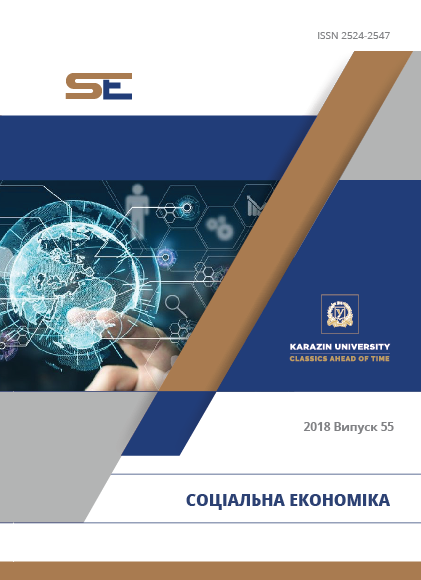The Role of Emotional Intelligence in the Work of Executives by Different Anagement Levels
Abstract
In modern conditions of globalized society in the theories of management, there is growing attention to emotional information, its importance and the need of its effective use. Researches confirm that emotions can act as organizational resources that can be managed to improve organization’s effectiveness, employee’s performance and create a favorable moral and psychological climate, both within the organization and with external stakeholders. This article studies the main approaches to the application of the concept of «emotional intelligence» among the various levels of management in the organization and offers authors’ development to improve competencies in this area. The relevance of the research is proved, which consists in special attention to the problems of exchange and use of emotional information among personnel and management. The basic competences those are necessary for the development of emotional intelligence from a position of importance for different levels of managers are studied. This article analyzes the development and practices of implementing programs to enhance emotional intelligence in international organizations and corporations.
The purpose of the article is to study the influence of emotional intelligence on different levels of managers in order to identify the main areas of competence development.
To achieve the set purpose the following tasks have to be solved: to study the concept of «emotional intelligence», its components; to study the basic competences of emotional intelligence; substantiation of competencies and their importance for managers; to research the best practices on increasing the emotional intelligence in organizations and results of its implementation; to analyze the need to apply and develop emotional intelligence among different levels of management.
Authors use such research methods as analysis and synthesis, abstraction and generalization, comparison and competency-based approach.
The result of the work is developed recommendations for increasing emotional intelligence among executives based on the analysis of the importance of different competencies for different levels of management.
Downloads
References
Mayer, J.D., Salovey, P. (1997). What is emotional intelligence? New York: Basic Books.
Salovey, P., Grewal, D. (2005). The Science of Emotional Intelligence. American Psychological Society. [online] Available at: http://citeseerx.ist.psu.edu/viewdoc/download?doi=10.1.1.385.2439&rep=rep1&type=pdf [Accessed 20 Apr. 2018].
Mayer, J.D., Salovey, P., Caruso, D.R. (1999). Emotional Intelligence Meets Traditional Standards for an Intelligence. Intelligence, 1999, 27, pp. 5–27.
Mayer, J.D., Salovey, P., Caruso, D. (2002). The Mayer-Salovey-Caruso Emotional Intelligence Test (MSCEIT). Multi-Health Systems.
Goleman, D. (1998). Working with Emotional Intelligence. New York: Bantam Books.
Rekun, G., Sardak, Y. and Pastukhova, N. (2015). Innovative changes in human resource management in terms of economic turbulence in Ukraine. Social Ecomomics, 2, pp. 162–168.
Rekun, G.P. (2017). Emotional leadership in the personnel management system [“Emotsiine liderstvo v systemi upravlinnia personalom”]. Economics and Society (electronic scientific professional edition), 2017, 13, pp. 691–696. [online] Available at: http://economyandsociety.in.ua/journal/13_ukr/117.pdf [Accessed 20 Apr. 2018].
Knysh, A. E. (2017). Emotional intelligence leader in business [“Emotsiinyi intelekt lidera u sferi biznesu”]. Kyiv: Research and Production Center «Priorytety».
Consortium for Research on Emotional Intelligence in Organizations. [online] Available at: http://www.eiconsortium.org/index.html [Accessed 20 Apr. 2018].
Freedman, J. (2014). Case Study: Emotional Intelligence for People- First Leadership at FedEx Express. Six Seconds. The Emotional Intelligence Network. [online] Available at: http://www.6seconds.org/2014/01/14/case-study-emotional-intelligence-people-first-leadership-fedex-express/ [Accessed 22 Apr. 2018].
Bourke, J. and Dilon, B. (2016). The six signature traits of inclusive leadership. Deloitte Insights. [online] Available at: https://www2.deloitte.com/insights/us/en/topics/talent/six-signature-traits-of-inclusive-leadership.html [Accessed 22 Apr. 2018].
Ovans, A. (2015). How Emotional Intelligence Became a Key Leadership Skill. Business Review. [online] Available at: https://hbr.org/2015/04/how-emotional-intelligence-became-a-key-leadership-skill [Accessed 20 Apr. 2018].
www3.weforum.org. (2016). Global Challenge Insight Report «The Future of Jobs». World Economic Forum. [online] Available at: http://www3.weforum.org/docs/WEF_Future_of_Jobs.pdf [Accessed 22 Apr. 2018].
Centr «Rozvytok «KSV». (2016). Navychky dlia Ukrainy 2030: Pohliad biznesu. [online] Available at: http://csr-ukraine.org/wp-content/uploads/2016/10/%D0%9D%D0%B0%D0%B2%D0%B8%D1%87%D0%BA%D0%B8_2030.pdf [Accessed 20 Apr. 2018].
www.ey.com. (2017). Strategic prospects for the development of the Ukrainian labor market [“Stratehichni perspektyvy rozvytku rynku pratsi Ukrainy-2017”]. EY. [online] Available at: https://www.ey.com/Publication/vwLUAssets/EY-kyiv-post-EY-strategic-outlook-for-the-ukrainian-labor-market/$FILE/EY-kyiv-post-EY-strategic-outlook-for-the-ukrainian-labor-market.pdf [Accessed 22 Apr. 2018].
www.ey.com. (2017). Methodology of studying the level of employee engagement [“Metodolohiia doslidzhennia rivnia zaluchenosti spivrobitnykiv”]. EY. [online] Available at: https://www.ey.com/Publication/vwLUAssets/ey-employee-engagement-survey-metodology-ukr/$FILE/ey-employee-engagement-survey-metodology-ukr.pdf [Accessed 22 Apr. 2018].
www.roberthalf.com. (2017). Why Do You Need Emotional Intelligence at Work? HR in Asia. [online] Available at: https://www.roberthalf.com/research-and-insights/workplace-research/emotional-intelligence-at-work [Accessed 20 Apr. 2018].




